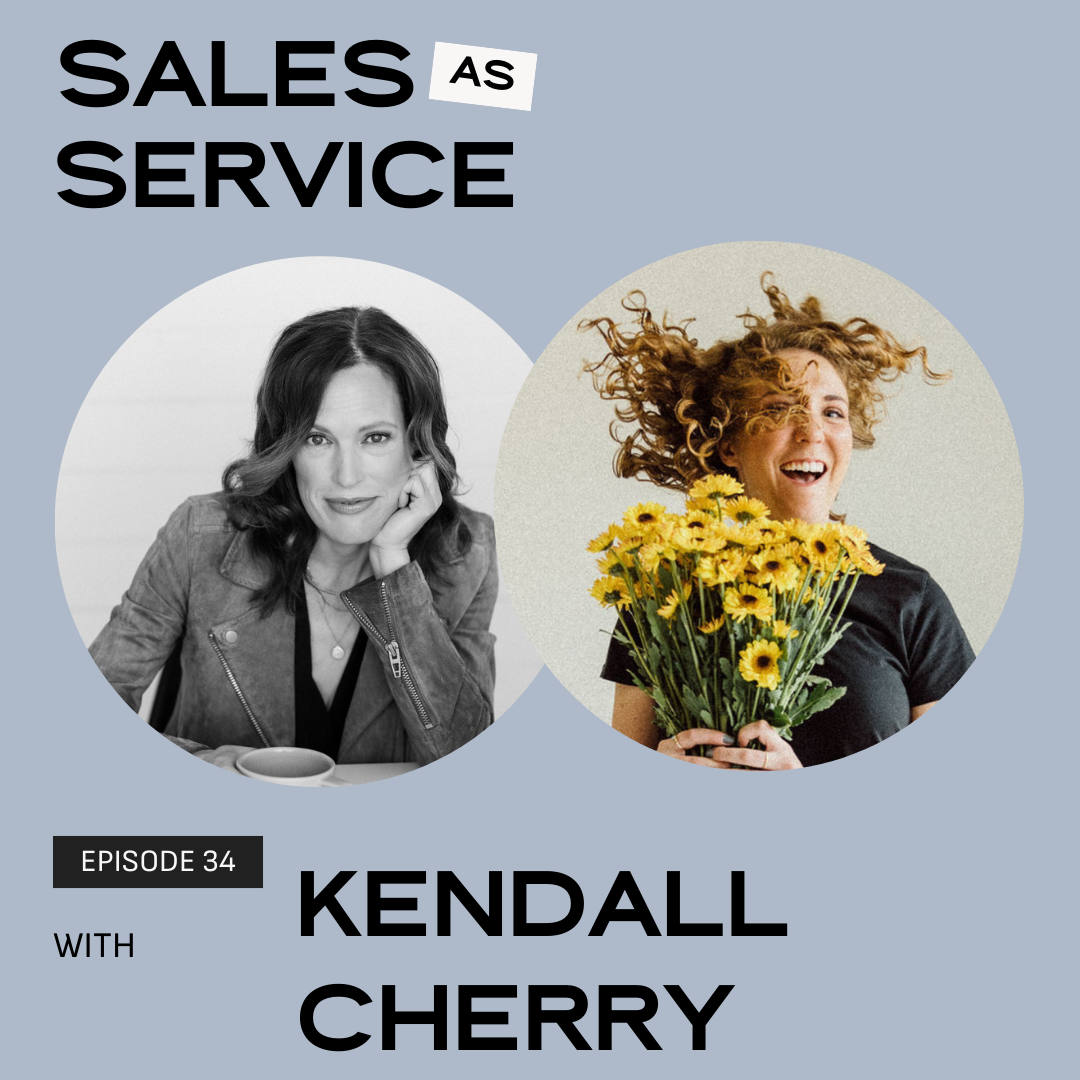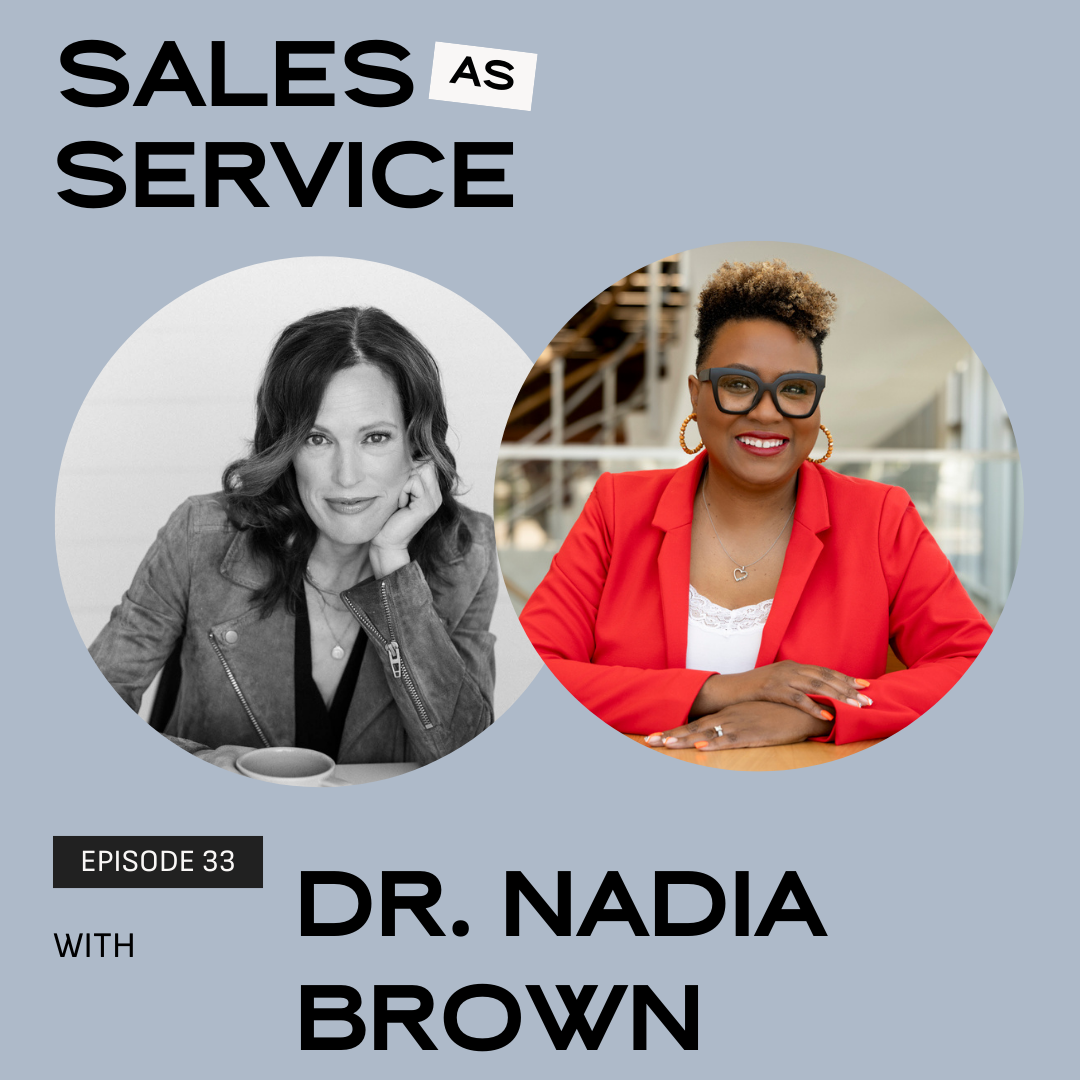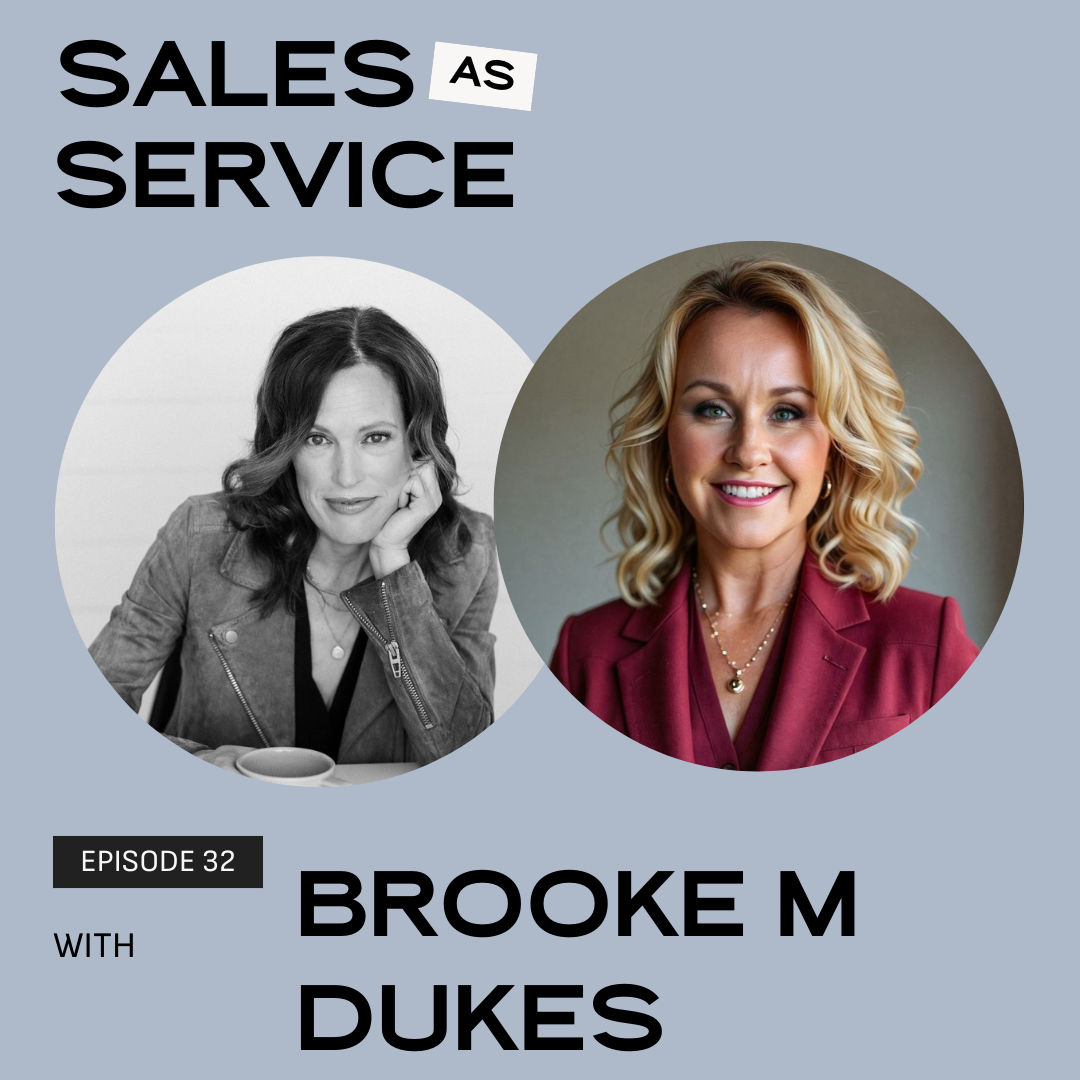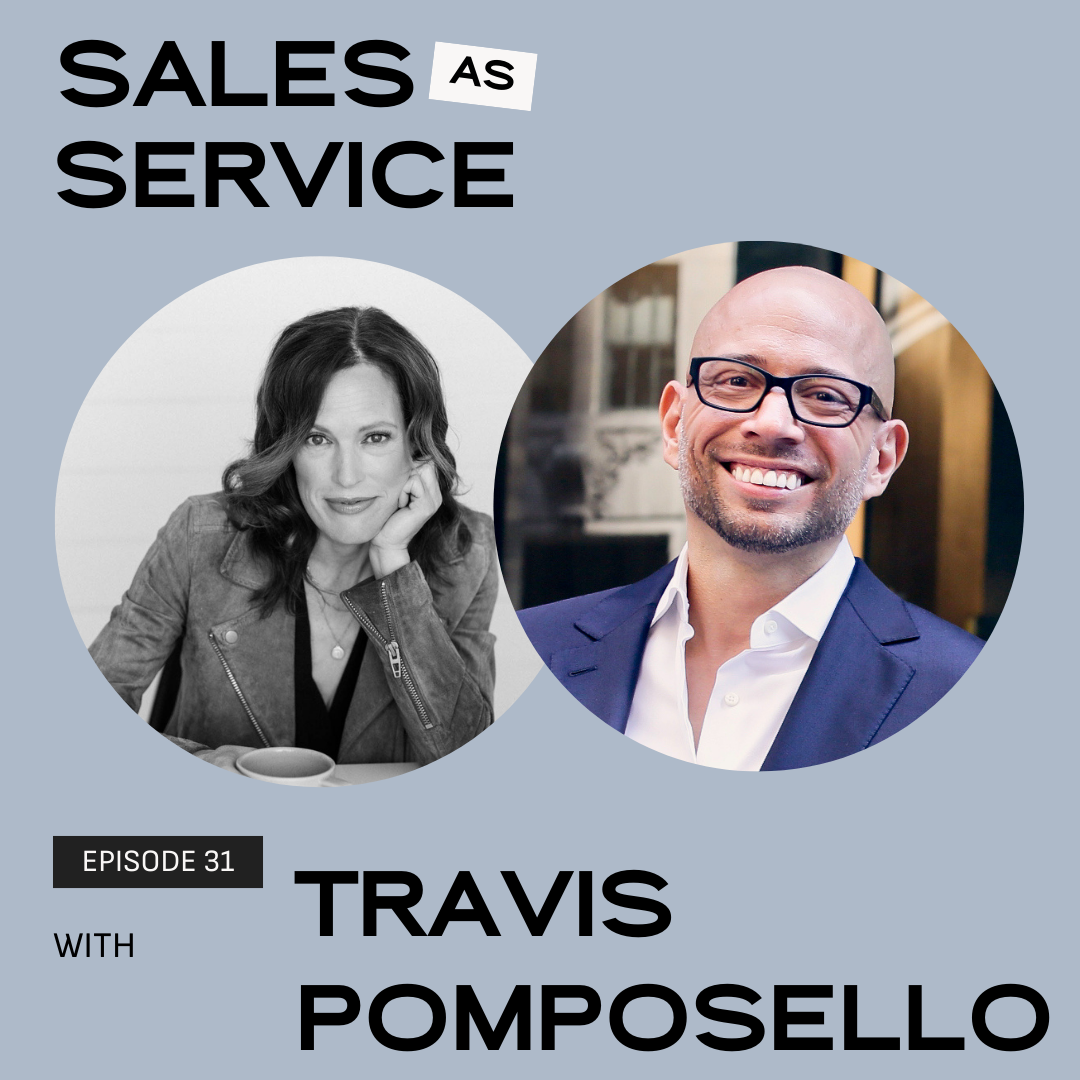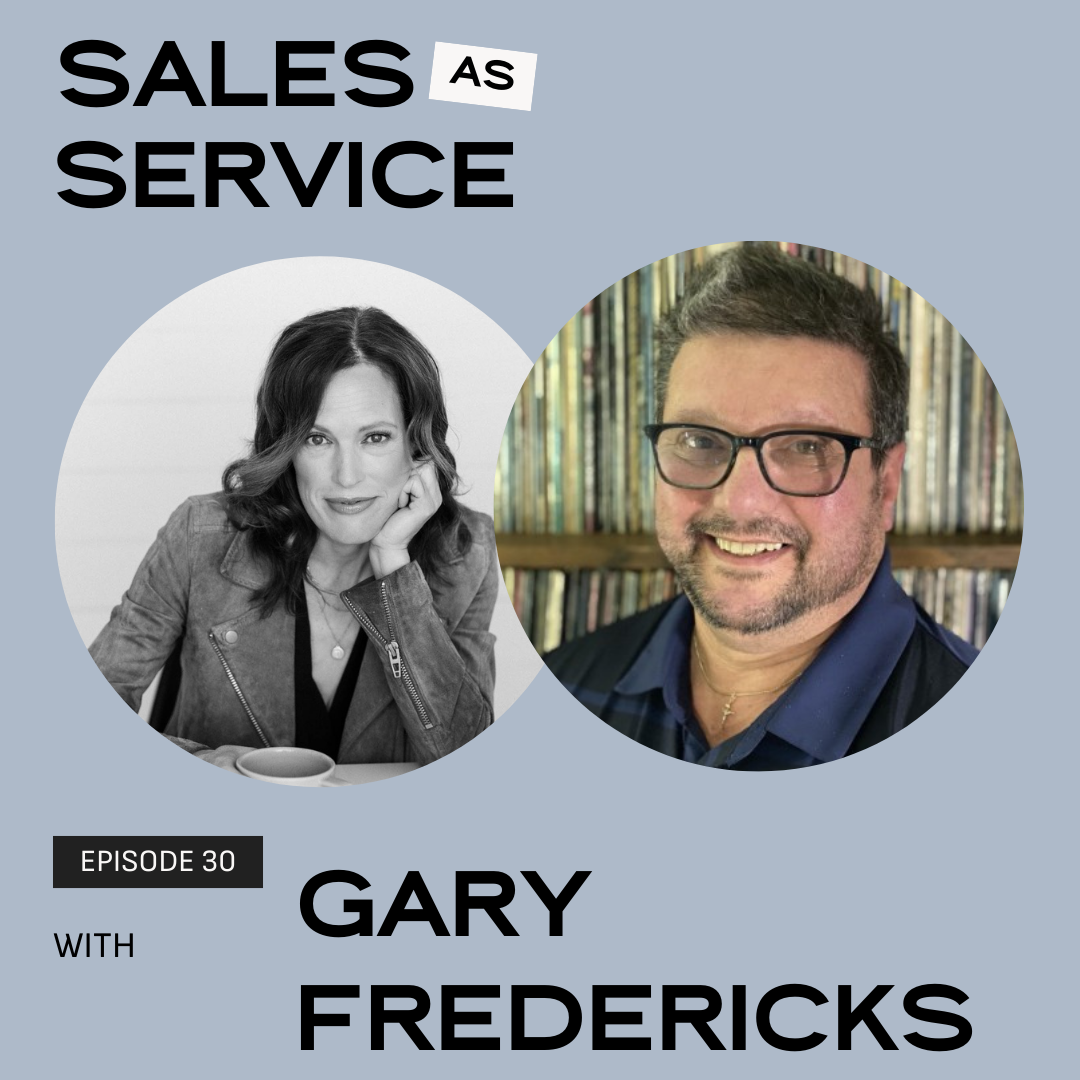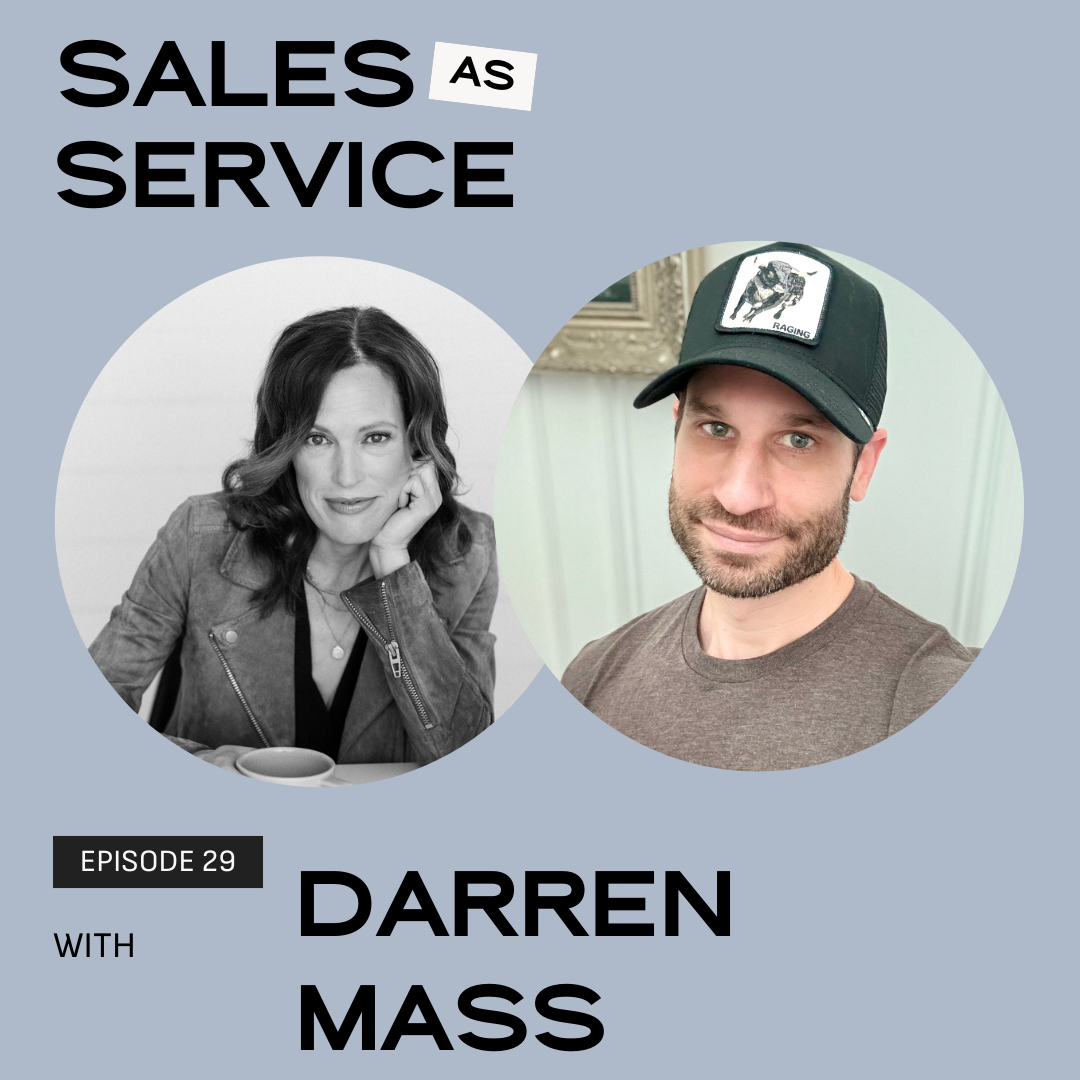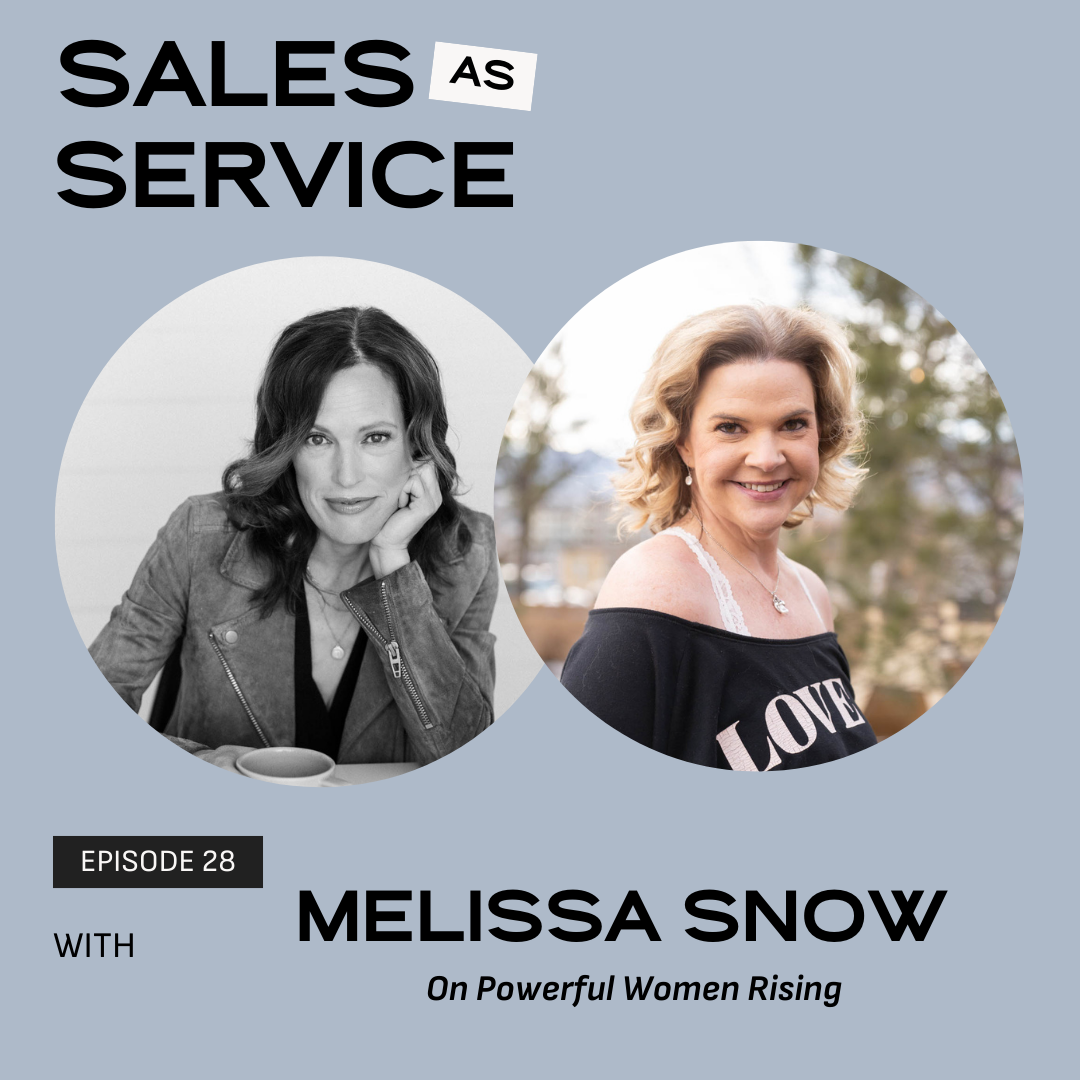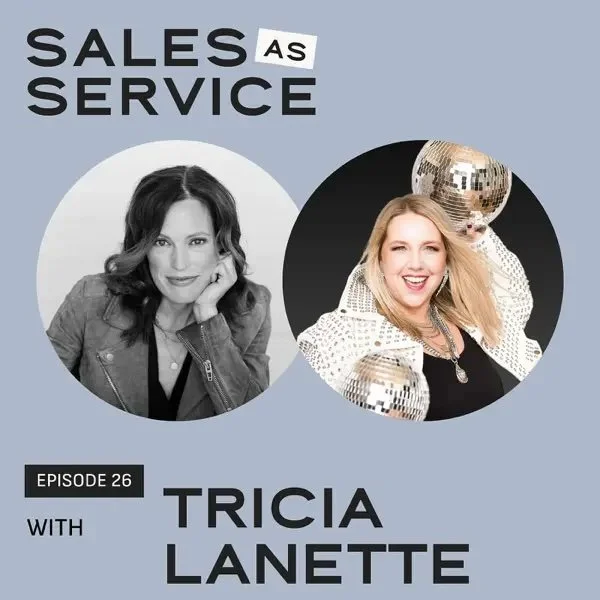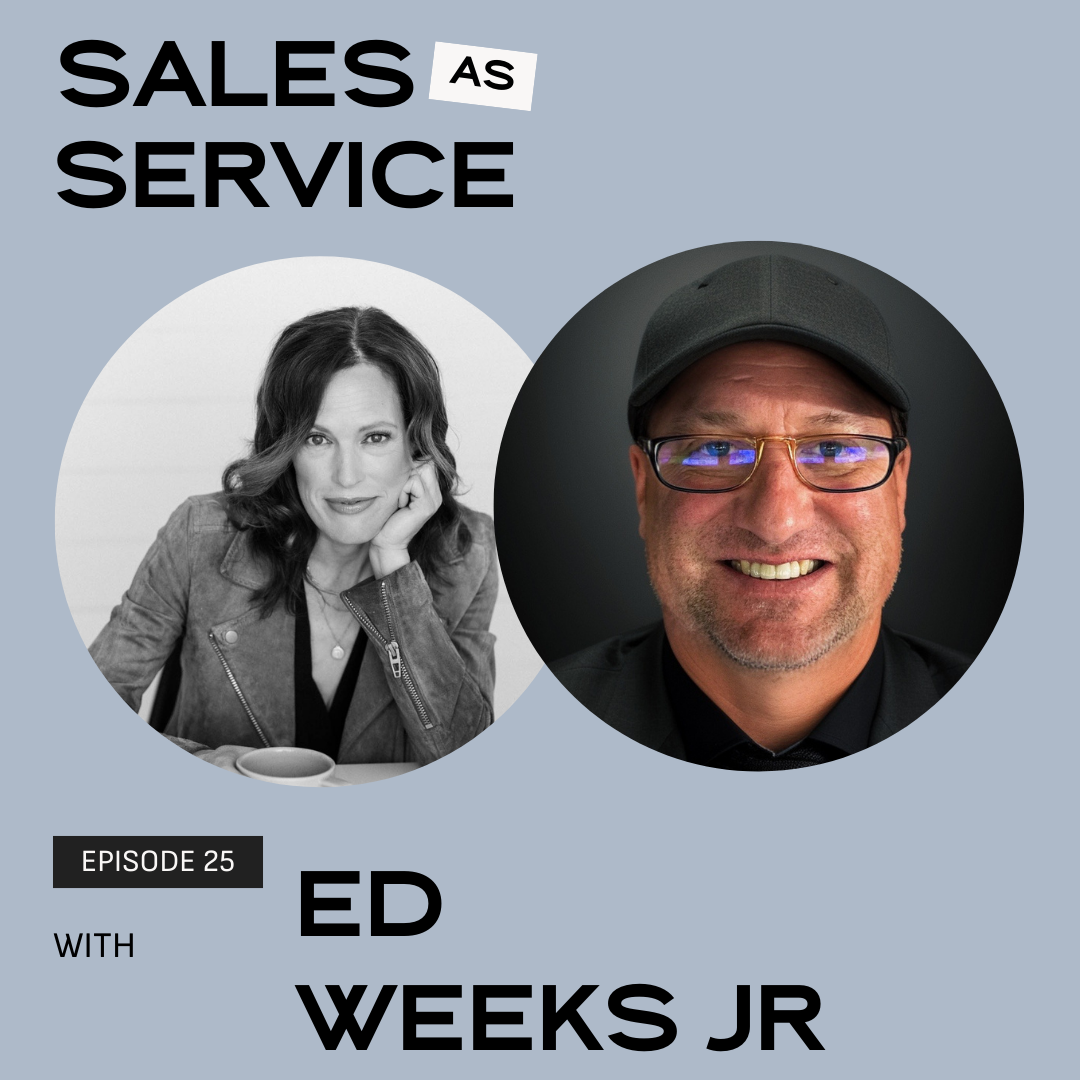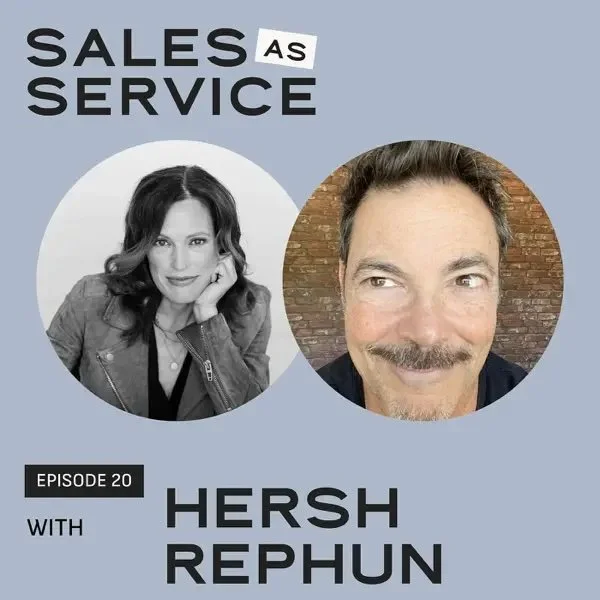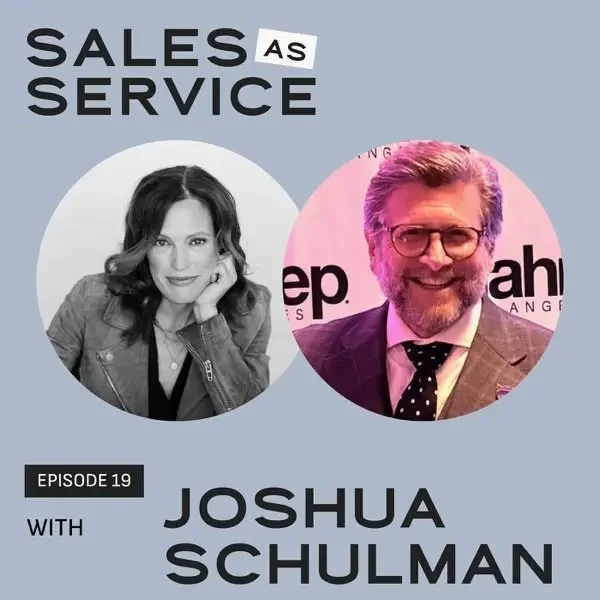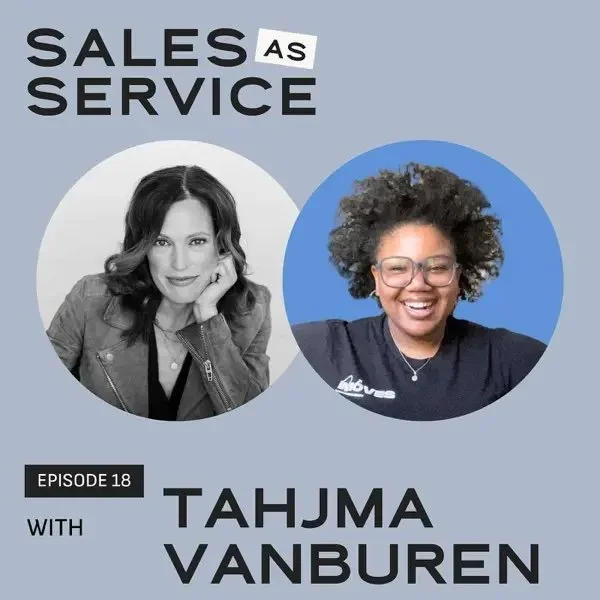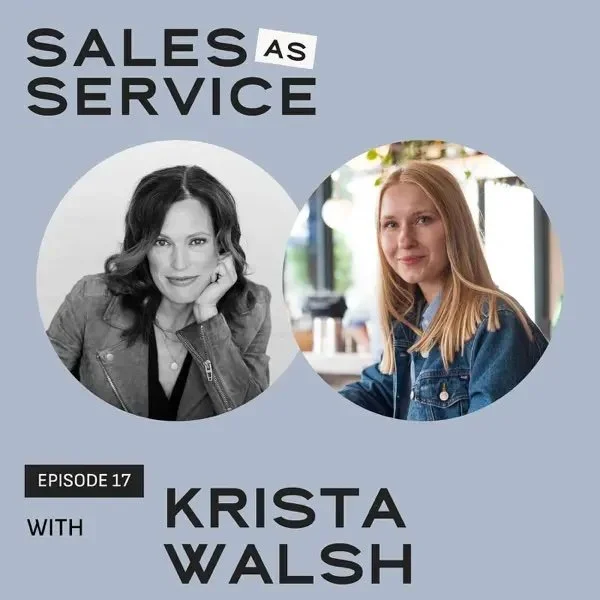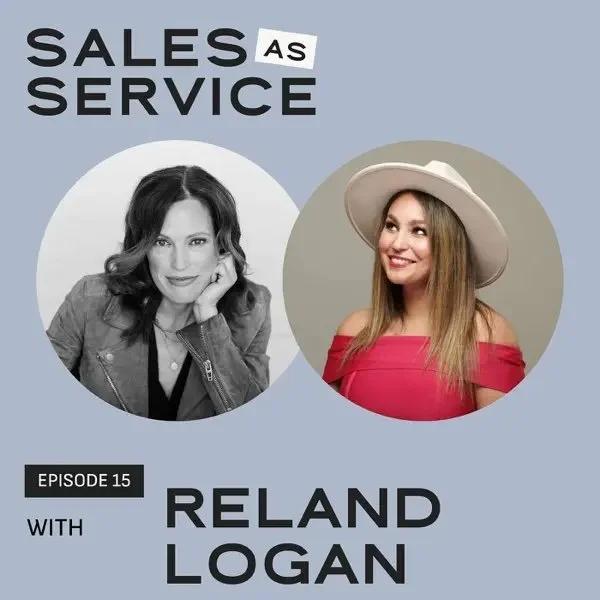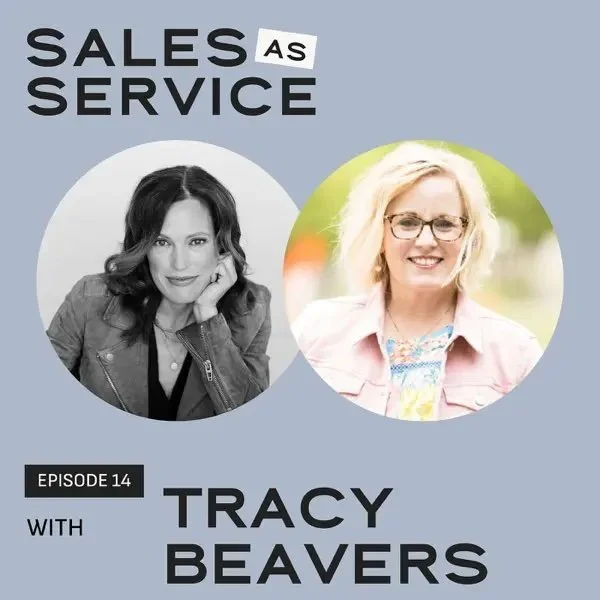Your Website Should Be Closing for You: Messaging Tips with Krista Walsh
EPISODE: 17
Revenue isn’t just about reach—it’s about clarity. In this episode, I’m joined by website messaging expert Krista Walsh to talk about how your website can actually support your sales process.
We explore the shift from “here’s who I am” copy to content that meets your clients where they are—specifically in the moment they’re ready to hire.
Whether you’re running a creative agency, coaching business, or service-based consultancy, this is your reminder that a beautiful website isn’t enough. You need words that work.
Key Takeaways:
Most websites talk at clients instead of speaking to them. The goal is clarity, not cleverness.
Treat your website like the bottom-of-funnel sales tool it should be—not a static brochure.
The best content starts with one question: “What does my client need to hear to take the next step
LISTEN TO THE EPISODE HERE 👇🏻
-
[00:00:00] My clients don't really wanna work with clients at this like high experiential level who are just choosing them because they were available or because they were less expensive than somebody else. Like they wanna work with people who specifically wanna work with them and trust them as the expert. So in order to do this, you want to shape your website for that bottom of funnel.
And so when you do that, your website becomes a lot more like. Targeted to this person, and you don't have to do all of this like nurturing content. You're really making a really clean, concise, powerful argument for why you, so the websites become leaner, they become more targeted, and you get on calls with people or get inquiries from people who are like, I'm pretty sure it's you that I wanna work with.
Instead of potentially, you know, calls with people who are like, okay, I'm just sort of exploring. Welcome to Sales is Service. The podcast designed to help you change your mind about sales. Literally, I'm gonna help you change the way you think about selling. I'm Tam Smith, your host sales bestie and pitch partner next door.[00:01:00]
You're tired of bros with biceps telling you how to crush a million dollars in your sleep or battling imposter syndrome on your own. You've come to the right place. All you need to do is listen, then take action. No gym membership required. Let's get started.
Quick question for you. How many new business inquiries did you generate in the last 30 days? How many were actually sales qualified, and how many of those converted into paying clients? If your results are inconsistent or, hey, maybe you don't even know how to answer that, we need to talk. That's why I created the five minute sales audit.
In just five minutes, you'll walk through a simple set of questions about your sales process, and within three business days, I'll send you a personalized video audit and a detailed PDF checklist. You'll see what's working, where the gaps are, and one low lift action you can take right now to improve lead generation and client acquisition.
It's quick. It's actionable and it'll give you clarity on what to fix Next, book your audit today at Studio three 40 nine.com/sales-audit. Alright, let's get into today's episode. And we're back. Tam [00:02:00] here, sales Growth strategist and your host of sales as service where we're rethinking how we sell by starting with how we serve.
So my accent. It's a mix of Mississippi, Tennessee, and southwest Georgia with about 15 plus years of Texas layered on top. So let's just call it the South. And some of the absolute best career advice I've ever received came from legendary Mississippi News reporter in Anchor Burt Case. I was a freshman in college home touring WLBT in Jackson, Mississippi, and considering a future in broadcasting, I was fortunate enough to meet Bert and I asked him what it takes to be successful.
He didn't even pause. Young lady, there are three things you need to know in order to be successful. He said, and that's right, right, and right. And he was absolutely right. Every major shift in my career from TV and experiential marketing to cosmetic retail and sales has all come down to one thing. The ability to communicate clearly and connect with the people I'm here to help.
That's what opens doors, that's what builds trust. That's what sells. So today we're [00:03:00] digging into the words we use. On our websites, in our outreach, and across the entire customer experience. My guest is Krista Walsh. Krista is a website messaging expert who helps service-based businesses stop treating their sites like static brochures and start using them like the bottom of funnel sales tools.
They should be. We're unpacking the messaging mistakes that cost you conversions. The mindset shift from talking about yourself to talking to your clients and how to make sure your website isn't just pretty, it's helping you close the sale. I know this is gonna resonate with so many of you. Whether you're running a creative agency, a consulting practice, or any kind of service-based business, your website shouldn't just look good.
It should work as an active align part of your sales process. Let's get into it. Krista, welcome to Sales of Service. Let's start here. Who do you help and how do you serve? Yeah. Well, I think my bio said it, but I will reiterate maybe in more regular people speak. Yeah. I work with service-based business owners, so sometimes they are [00:04:00] solo and they're like a true expert in their field, like they provide a service or they are consultant perhaps.
And then sometimes I work with more scaled up service businesses, so they have a team that's replicating the service for them, or they might have some other types of offers like a membership. Things like that. But the, the through line is that, I call them expert led because they are typically people who are really good at what they do, and that is pretty much why they've become so successful.
It's not because of their marketing or because of their fabulous website or whatever. It's because of. How amazing they are at what they do. So my job is when somebody is ready to amplify that more, and I call it like fully embracing your sought after era. A website really comes in as that tool to qualify leads, possibly to increase volume of leads, to expand, you know, traffic to your website through your own visibility s efforts or through like SEO work that I do with them too.
And so we're really trying to shape their website so that it actively, you know, explains. This answer to why them like, Hey, my rates are higher than average, [00:05:00] maybe a lot higher than average, but there's a real reason for it. And making them like the no-brainer choice. You set that up so well. You talk about treating the website as a bottom of funnel sales tool, not just a marketing brochure.
Can you break that down a little bit for us? Like what shifts when you. That mindset. Yeah, so a marketing brochure website. I think this is like best practices advice, which it's sort of like, in my opinion, coming from like the the online business course creator world where you're essentially setting up your website.
To speak to everyone at every stage of awareness. So I think your audience probably understands what is, what stages of awareness are, but correct me if I'm wrong for, for the sake of the conversation, just at high level. Yeah. I mean, so high level it's like you're totally unaware. Like you don't know you have a problem and so therefore, like you, you never explored solutions to it.
'cause you don't even know the problem exists. Right. Then there's, there's problem aware, you're like, I think I have this problem, but you have no idea. Like who? Who or what would solve it. And then solution aware is you've started to like do some research into the market and you're [00:06:00] like, okay, I see these different solutions.
And then usually it's called like product aware or service. Like this is where you're like aware of specific brands or people that can do the solution for you. So most website advice is sort of like. Let's take everybody through all those stages of awareness, pretty much, or at least starting with the problem aware, like maybe, maybe not the unaware people, but it's a lot of content around like, Hey, are you struggling with this and this and this?
Like a lot of like set up content to help people like become problem aware, like really like relate to their problems. And then you go into, at the very, very end, or like maybe only on your contact page or in your CTA, on your website, you're like, okay, hire me to do this. And in my opinion, this doesn't work very well for.
Expert led service providers who are charging more than average, whatever that means in your industry. Because what you're essentially doing is selling people on the idea of the deliverable or the outcome and not on you specifically. So if you get to that point with somebody, they're probably just gonna be like, yeah, I do need this thing.
But they're gonna go with whoever is [00:07:00] available first, or who, whoever is, you know, cheapest maybe. My clients don't really wanna work with clients at this like high experiential level who are just choosing them because they were available or because they were less expensive than somebody else. Like they wanna work with people who specifically wanna work with them and trust them as the expert.
So in order to do this, you want to shape your website for that bottom of funnel. Or another way of putting it is ready to invest client, somebody who is. Already problem aware, they're already solution aware. And now they are just trying to decide who is the best fit for them. Like who can they trust the most, who feels like the no-brainer choice.
And so when you do that, your website becomes a lot more like targeted to this person. And you don't have to do all of this like nurturing content. You're really making a really clean. Powerful argument for why you, so the websites become leaner, they become more targeted, and you get on calls with people or get inquiries from people who are like, I'm pretty sure [00:08:00] it's you that I wanna work with.
Like you were speaking to me where I'm at. Instead of potentially, you know, calls with people who are like, okay. I'm just sort of exploring like, wait, what do you charge? So hopefully that was a, a good explanation. Wanna a little bit longer, but yeah, I mean if it's made me kind of, I am thinking about my own website and others that I've seen is that we spend perhaps too much time speaking to the.
Attraction, problem solving versus the folks that are coming to the site inevitably already have, have gotten through that we don't need to go back through those steps and getting right to the, how do we work together and spending more time on educate that person like you are the right choice to solve that problem.
It's not the, all the upfront other stuff. 'cause they, they're at that place by the time they engage with you. Is that kinda what I'm hearing? Exactly. Yeah. One, by the time somebody's on, I mean. Listen, all kinds of people are going to your website competitors, people who wanna launch a business like yours.
You know, people who are just exploring and like, they're like, wait a minute, what is, what does Tamara do? Whatever. But [00:09:00] in my opinion, like we don't really care about them because it's a huge lift to take somebody from like, wait a minute, do I have a sales problem to, okay, let me pay somebody. Most of my clients are at least in the four figures, many of them in the five figures.
Like that just usually doesn't happen. Like this mindset came from the course world where it. The, the price point, the time commitment, the like intimacy commitment, frankly, is like a lot lower. So it's a lot more likely that a sales page would take someone through all of that. But like the expert services market is completely different and it just doesn't happen like that.
So. Yes. Speaking to somebody who is already at your website because they're trying to decide whether or not to talk to you is the person I would speak to. I wanna clarify that there is nuance here. Like for instance, I'm working with one client right now. She's a consultant in the. The AI marketing space, and this is an emerging field.
So we are doing more education. We are doing some more like problem aware stuff on her site [00:10:00] because it's not a straightforward service where somebody's like, oh yeah, I need a bookkeeper. Or like, oh yeah, I need a trademark attorney. It's, it's a little bit, it's emerging, right? So most people in her world, like aren't totally solution aware yet.
So there are nuances here and I definitely work with people in that. And I also wanna say, I'm not saying you can't do any. Pain points stuff or anything like that. Like you totally can, the, the thing I wanna make sure you do, if, if that resonates with you, you're like, I really want people to feel like I get it.
Like that's what the pain point should be for. But keep it light touch, keep it specific, keep it targeted, and spend the bulk of your time on your website, on the, the bottom of funnel stuff. On the like, okay, now that you know I get your problem here is why me? Right. Instead of like just doing that in like a tiny CTA or something.
Yeah, yeah, absolutely. It is like kinda the same thing when you talk about just, even when you're deciding for your business, who you help and how you serve. You know, I talk to some people, well, you know, my solution can help everyone. Well, for the purposes of, you know, you've, you gotta get really focused [00:11:00] and I think even maybe, you know, there.
A lot of us, when we approach our websites and content and copy, it's like we wanted to speak to everyone, you know, and go, going back to, you know, that that one person that you really want to work with and do business with and getting more focused in how you're messaging that versus, you know, casting such a wide net with the copy and content.
Exactly. Right. And I think we all start off casting a wide net, you know, and that's where this like basic best practice advice really comes through where it's like, okay, like make sure it's clear what you do. Like I see this advice a lot and that. That is obviously like, yes. Like if that's not clear, we've got a problem.
But once you get to this point where you have like a specific person you're working with, you're dialed in on what you do, you know, you, you really wanna only work with those people who are like perfect fits or you wanna get more of those people in the door. Yeah, we need to do a lot more targeted.
Thinking through our website than that. So when someone lands on the website ready to buy or inquire, what are the key things that need to happen or even, let's say, not happen for them to take [00:12:00] action? Yeah, so I mean, key things that need to happen is they need to, they need to see that you are the person that can solve the problem that they have or help them achieve an outcome that they're looking for.
I find a lot, a lot of the clients, of my clients, so part of my process is I interview. Your clients who have worked with you who are in this, like the, the type of person that you wanna work with more. And a lot of them talk about like their, the reason that they're seeking to hire is a lot more like long-term thinking.
It's a lot more like outcome, goal, identity shifting type of language and less like, I've got this urgent problem, I need it solved. So. Whatever that, that, that mindset that they're in, when they're in the, like the hiring mindset, ready to invest tomorrow, mindset, or I wanna set this up for August mindset or whatever it is.
Figuring out like what kinds of things they're looking for and then meeting them at that place. So this is where it does get, you know, custom to you. Like it might be different for each type of service, each type of market. So I would say that's the biggest thing that needs to happen is, is meeting somebody where they are when they're in this place.
[00:13:00] Other things that are a little bit like easier to wrap your head around. It's, you know, making it pretty easy for somebody to reach out. We always wanna, we, we do wanna balance qualifying, you know, we, it isn't, we don't want it to just be like, anybody book a call my calendar, you know, without any questions or anything, but not making this.
Making it like a, a hidden link or something, or like just an email that's like at the bottom of your footer or something, but like a really clear, like, Hey, here's how you reach out. Here's what's gonna happen after you reach out. And then throughout that process you can have the qualifying piece in there.
Yeah, I think, I think those are the, the two biggest things. It, it's funny, well, not funny, but you know, you think it's such a no-brainer. To make it easy for people to know how to get in touch with you. But just from my own experience navigating websites, that is, it's surprising to me how difficult sometimes it's made to know how to contact someone and what the next right step is.
So I appreciate that. You know, you think it's like, well, yeah, no brainer, but to point out, check and make sure that, you know, you remove as much friction from people to be able to work from [00:14:00] you as possible. 'cause I, I am just surprised in my own experience how hard some sites make it. And I also. Like appreciate too.
I think that's a really unique step to you. Um, you know, I haven't heard of other content creators, you know, web strategy experts, you know, do, taking that step to do the client interview and actually taking that voice of the client work and weaving it into, you know, letting it inspire and weave it into the, the website content.
Think it's really. Genius on your part, so Yeah, I love that. Yeah, I, it's really fun to do also as like part of it, like I do collect new testimonials from them as well, so it's really fun to like launch a website with recent testimonials that are speaking to like what you're actually doing now. Yeah. So it's, it's totally one of the best parts of the process.
Yeah. For business owners who feel like their website isn't quote unquote doing anything for their sales. What's the first place you recommend they look at or audit? Great question. I hear this all the time. Honestly, one of the biggest things is people just not using their website at all. So [00:15:00] I, that would probably be the thing to check.
So usually it's like an emotional thing. Like sometimes it's like, oh, I just like the design. I don't like it anymore. Or like. It just doesn't represent me. Sometimes people are more clear about it, like they're like, what it's saying is really outdated, like I don't actually offer that anymore. Or the type of client that I was speaking to three years ago, five years ago is no longer the type of client I work with now.
So you have this like inherent sense that you don't want people going there because you know that they're gonna get the wrong idea. So you don't link it anywhere really, or you like barely. You kind of are like, I hope people don't go to it, you know? To me, that's kind of like me being like, well, you know, like Pinterest just isn't working for me, but like, I'm, I'm not on there.
You know what I mean? It's like, well, of course, like, you know, like you made an account and you kind of just like let it go on its own and of course it's not working for you. So that would be the first thing to check is just like, hey, like maybe the reason you think it's like a dead asset is because you've let it die.
No shame. I'm actually in this place right now 'cause I'm having a designer redo my site, so I'm just, I'm not really linking to mine so much right now. So it's like. [00:16:00] I get it right. There are periods that you go through the, the second thing is, you know, I'd probably look at your messaging second, like, how well is it differentiating you?
How well is it positioning you as the obvious choice? So you could start by like, Hey, who are the people that you know, serve a similar market, do a similar thing and take a look at their websites? Take a look at your website. Like is it clear, like what makes you different? Are you all kind of saying the same thing?
Most people I work with have a sense inside, or they've, they're able to articulate it in like short bursts of content where they feel more confident. Just like putting stuff out there, like what their perspective is, you know. What their processes that is different or like the way that they're embodying their brand voice or all of these different things, but they struggle with articulating it on something as overwhelming and permanent feeling as a website.
So it's just not coming through there and you sort of default to saying like the safe stuff that everybody else is saying. So that's what I would do. You could even like screenshot them and like upload them to chat and be like, Hey, like. What [00:17:00] do you think the differences are between these people? You know, including me, right, and just see what it says.
You know, if you're struggling, be objective. Those are probably the two places I'd start. You know, are you actually using your website? And two, like is your messaging differentiating you or is it just sort of selling the idea of your service and not you? Yeah. And to the point of like treating your website.
As an active asset that you're nurturing, uh, how do you recommend business owners leverage, you know, their website copy and the site itself beyond just the site, like in their other, you know, social media, email, you know, even sales conversations. How can they effectively, you know, make it a, a living asset in their business?
I mean, I think what I meant by that is a living asset in terms of like, you're letting it do its job as a, as a sales tool. So you're, you're linking to it. You're saying like, Hey, apply through my website, book a call through my website, you know, go to my web. Somebody asks about your services. You're like, oh, yeah, I totally do that.
Here it is, you know, using it in your visibility efforts, like a podcast interview, linking to it [00:18:00] there, stuff like that. But yes, you can also definitely, you know, take the ideas that you create through your website and use that whenever you're doing like bottom of funnel content in your social media. I know a lot of people will take like about page sections or like bio sections and use that as like a LinkedIn profile.
Most of my clients end up with like a tagline that we used on their, in their hero, and it just is a beautiful tagline, or like a tagline that we put in the footer of their website becomes something they use over and over again. So yeah, there's a, there's a. Ton you Absolutely. Full permission to like copy, paste, use at other places or make it your own.
Yeah, I think I wanted to point that out. 'cause so many of the conversations I have with business owners, they don't realize the potential of that to work for them beyond just the website. You know? Yes. The, the asset of people coming to it, you know, and, and attracting the right clients. But being able to take that content and copy and leverage it, you know it 'cause it's.
Done well and done by you. You know, it's beautiful strategic content that can, you know, work for them, you know, off that page in to your [00:19:00] social media, in their email newsletter, like in all of their, it doesn't have to, it's it's not just website copy, you know, it has legs and can be definitely be used in other PA places and leveraged in other places.
In your, your sales process, what do you see the role of? How do you see the role of website content evolving? You just as buying behavior has become more very self-directed and trust-based. Yeah, I saw this question. Can you elaborate on this? Like what do you mean by the buying behavior shifts? Yeah, I, I think you know that it is when people come to the website, like how are you evolving, knowing that people just want to kind of.
It be more of a self-led, self-directed experience versus necessarily like needing that like direct high touch with having a, like ending up on a sales call that someone could ultimately like book. I don't know if you work with, I guess it's every, is the goal of everybody that you work with to get them on a call or is there some that people can actually go through the whole process on the site to actually like, okay, great.
[00:20:00] Sign me up before ever actually having a sales conversation. Yeah, I think it depends on the, the client and the, the offer. So for instance, I worked with a, a designer earlier this year for like a show at Website Designer, right? And we're thinking about her site structure and she has several different offers.
Like she has templates, obviously, she doesn't wanna talk to people who buy the templates, like she just wants 'em to buy the templates. She has like a middle tier offer, which is a website in a week that is like template based. So it's more, it's not custom. I mean it's customizable, but it's like. Kind of like a website in a box that she puts together for people.
Right. And so for that, she's open to chatting with somebody if they needed to. But yeah, we really tried to structure that one so that people could just buy that offer because it is, it's like very clear what you get. Everybody gets the same thing. The timeline is the same for everybody. The price is the same for everybody.
But then she also has like the bulk of her work is this custom brand design and website. Brand strategy, brand designed website creation, and this is a lot more custom. It's [00:21:00] not everybody gets the same deliverables because some people don't need like photography, art, direction. Some people do and because it's so time intensive, it's like spanning on months and it's pretty intimate.
She does prefer to talk to people for that, like she doesn't want somebody to buy it and then they end up being like a nightmare or something like that, or, or being more positive about it. They're just like not in the right place to benefit for it, so it doesn't feel super good. So. You know, there are different strategies definitely with if you have offers that you don't wanna talk to people about because of the price point or because it's so productized.
Yeah. This is where I would do things like, okay, here are the inclusions. You know, like, here is the price. Buy now. You know, like, do this inquiry form, I will send you the invoice. You know, things like that. If it's custom, I wouldn't, I would kind of do the opposite. Like, I wouldn't be like, here are the inclusions, you know, here are, here's the price.
Like I would give people an indication of price, an indication of the elements that go into it. But I would more position you as an expert that people are coming to to be told like [00:22:00] what they need. So, I don't know. I mean, do you have research that says people want. The more like they want the, like the, the middle tier offer more.
I'm just curious where this question was coming from. I, I don't have any, I think it's just like, honestly, with the, I don't have any data to support it, just honestly with just, you know, all of our digital tools and automations and AI to, and people honestly, like I'm, am an advocate of the conversation. I, you know, even saw a, I think it was a YouTube ad that the, the whole cell was like selling without ever having to talk to someone, which I'm not a fan.
Like I'm not trying to remove. Myself from the process, like I've, uh, but you know, knowing that a lot of other businesses are kind of leading that way with wanting to make it more of a self-directed, self-guided, you know, as far as how is that impacting the way you, when you write copy for that? I think it was really where it was coming from, um, is people just being able to self guide, self-direct without ever after having to have a, a conversation.
Just curious how it was impacting no, no data to support it. But yeah, I mean to, I [00:23:00] mean, yeah, I, people definitely want that. I think it, it definitely works if you can like, make something productized. I'm like, you like the, what I do is pretty like, it's, it's fairly intimate. Like I'm talking to your clients, like we are having long conversations, we're digging into things.
It, it expands like several weeks, right? So I personally don't really wanna work with somebody who refuses to talk to me first. And I, you know, I'm just one person, so I have limited availability. So. That, that's sort of like a way to filter somebody out who's not gonna take it seriously for me. But yeah, if I had something different that was more templated or something like that, yeah, I'd absolutely be like, yeah, buy it.
You know, just, you know. Yeah. That totally makes sense. Having something productized like that and at least, you know, creating other. Other streams, channels of income, you know, other, uh, opportunities for income. Yeah, I think that's really where that was coming from. Just thinking about different, it's not dependent on the one-to-one, you know, high touch, customized offer, you know, how you position strategically position the other channels of income [00:24:00] in the business, but.
That was kind of weird. I, I didn't know if there was a different approach or not. Just curiosity. There totally is a different approach. Yeah. And it's, it's really fun to think about that and, and also think about like, if you do have different types of offers like that, how to make sure people aren't just choosing the cheaper one or the templated one or the faster one, just because it's that, but they're actually choosing it because it's the best for them.
So there's like a lot of thinking in terms of that. Yeah, I think that, I think we're, we're getting at a great question here. Which is, you know, like, how, how do you, how do you think about things more strategically than just like, okay, I'm gonna like, present them all evenly and be like, okay, choose, you know, it's, it's really like guiding them into the right one very clearly.
I, I think even for me, it's, it's been very recently. You know, thinking about just how I'm structuring my own business and how I wanna work. 'cause I've put, I've put a lot of pressure on myself when I see, you know, messages like that about how to completely remove yourself from the sales process or, you know, sell directly, you know, sell it in the, you know, the dms and the [00:25:00] messaging.
And I think I'm realizing I, for me personally, it's just not how I want, how I enjoy working. 'cause I actually have saw like a DM from someone that said like, I'm no longer taking the sales calls. I just don't, I don't see a future for myself where I don't wanna, I mean, maybe I could reduce it at some point, but I just don't see a future for myself in my business where I wanna remove myself entirely from the process.
Uh, you know, again, maybe I have a, a scalable way to work with me that doesn't require that, you know, conversation. But it has prompted me to think just in the structure of my own business, how I, how I wanna work, and, you know, the people that I wanna work with value their relationship and the, the conversation.
More than you know it, turning it into a transaction. So I think, I guess that's probably, probably the difference I was getting at is a difference between the driving to relationship versus having a transaction. And it sounds like a lot of the content copy that you writing is really, you know, it's building it, it's.
Connecting, starting a conversation, creating [00:26:00] opportunity versus it just being a, Hey, swipe your card here, kind of experience. That's a, I have worked with people who like, yeah, they wanna talk to people first, but they also wanna be paid for that time. So like, I have worked with some agencies, especially like in econ world and stuff, where the, the first interaction is a paid interaction, but it's, it's sort of like, I don't, I don't wanna do like sales calls, but I wanna do like paid strategy sessions.
So if somebody is really serious. Like it's a fairly low lift in terms in like their world, right? Where if it didn't work out, like they would still get value from it, but it doesn't feel like I'm wasting my time on sales calls, like, go nowhere or something like that. Or you just wanna only talk to people who are bought in already.
I've seen, I've had other clients who, who have like, like Voxer links instead. So they don't like doing sales calls. They wanna do like async communication. So it's still like relationship building, but it's selling people. It's like, Hey, Voxer me, right? And we're gonna like chat about it instead. So I, yeah, I think there are ways to get, I've thought about this too for myself, like.
I [00:27:00] kind of like the sales call thing. Like I like seeing someone, you know, but yeah, if you don't wanna do that, there are ways to get around it that doesn't require you to give up the custom, like high touch nature of your work and like package everything. Mm-hmm. If you don't want to. Right? Yeah. So, and I think I've gave, like, just in my own business, you realize that, you know, you, you're.
One-to-one highly custom work. You know, you're capped at a certain point, you know, you're, you're one individual and you trying to think of creating a more sus, sustain, or scalable model, you know, where that I'm able to, you know, build out systems to be able to continue to grow and not, you know, cap in myself because of my own.
Bandwidth and limits, really. Yeah, absolutely. We'll jump into the fast five now. These are five questions, rapid fire questions we ask with every episode. You're, I can't live without it. Software or app. Yeah. My answer is Boomerang for Gmail. Are you familiar with this? Ooh. Yeah. It's so changed my life. It did.
It's so stupidly simple, but it's just like, oh my God. Like, okay, someone wants me to follow up in a month. I [00:28:00] don't have to remember. I just like boomerang it for a month. Absolutely. Mm-hmm. It's so helpful. Mm-hmm. And even, and I. Um, fight. I cannot let go of the whole, you know, inbox zero mentality despite my best effort.
So just the ability to like snooze things that I just either don't need to deal with right then or can't deal with right then in that moment and just get it out of my line of sight has just like reduced my anxiety. Absolutely. Yeah. I'm gonna respond to this tomorrow morning. Bam. Mm-hmm. Like, yeah.
Mm-hmm. It's, it's just, and you get that little, I mean, good or bad, that little dopamine hit of Oh, check that off. Yes. Outta sight, outta mind. Yes. I don't know. I did it like exactly. Best advice you've ever received about sales and business development? Yeah, I had a mindset coach a couple of years ago who said something like that helped me, like release the pressure of like signing this client that I'm talking to right now.
And I think it's pretty common advice, but she's the one who told me and, and it was like, if it's not [00:29:00] this, it's something better. Right? So just like. Whatever my revenue goal, it doesn't have to come through this engagement right here. Like I can just like actually be present with this person and talk to them and trust that if it doesn't work out, you know it will with somebody else.
Morning routine must have, this is my morning walks with my big pit bull mixed dog and my boyfriend and we go to our local coffee shop and grab, I get macha lattes, but he gets coffee and it's just such a lovely way to start the day together before we go to our respective works. That's a great way to start the day.
Your walk-on song, the one song that always pumps you up. Yeah, I saw this question and the answer that came to mind. Please don't judge me. But it's, it wasn't me by Shaggy. I don't know why, but like that song hypes me like nothing else. That's awesome. Going on the playlist. Now I feel like I need to Google if you got me toot or something.
'cause I, I haven't seen that, but like, like it's an old song. I don't know. Like, I'll leave it kitty. If you had [00:30:00] one hour, only one hour each day for business growth, how would you spend it? Ooh, good question. It would probably be some mindset thing. I mean, I do this every day, like it's like. Checking in with myself, with my vision of where I wanna be headed and like looking at everything that comes up and says that I can't get it.
I do that every day. 'cause every day there's something and I think it stops me in my tracks from like taking risks and, and doing things that I need to be doing. So I, I love that you're very intentional and thoughtful about that. I think that fight for every business owner, you know, that that comes up.
So that's just a great reminder. Just like, check in, remind yourself like you got this, uh, well, where can folks find you online? Yeah, so I am on LinkedIn, I am on Instagram, and I am on threads. Those are probably the best places to find me and yeah, I'll just leave you with that. Yeah. Awesome. Thanks so much for being here.
This has been such a valuable, insightful conversation and I think I will give folks the opportunity to really like take that audit, look at your website, like where can you position it, you know, as a stronger asset in your business and your sales process. So thanks for being here. Yeah, thank you for your lovely questions.[00:31:00]
Thanks again to my guest, Krista Walsh. I hope our conversation gave you a fresh lens on how your website can serve, not just as a digital business card, but as a real part of your sales process. Because when someone is actively looking to hire, they're landing on your site with one core question in mind.
Can I trust you to help me solve this problem? And that brings us to your sales of service challenge. For this week. I want you to step into that moment, the moment your ideal client is ready to hire, and then pick one piece of content. That could be your homepage, your services page, maybe even a recent email or LinkedIn post, and ask yourself, is this speaking directly to someone who's ready to take action?
Does it answer the questions they're carrying in that moment? Or is it still written from your perspective, talking all about you instead of theirs, their challenges, their fears, their goals, then revise that one piece of content with their mindset in mind with that kind of outward focus. Again, we're talking small shift, big impact.
And before we go, a reminder to be sure to check out the show notes to learn more about Krista and where to finder, plus all the links and resources we mentioned today. And if you've got an episode idea or a guest you'd [00:32:00] love to hear from, send me a DM on LinkedIn. I'd love to hear from you. Until next time, remember.
Sales is an act of service. It's about what you give, not what you get, and when you serve well, the ROI always follows. See you next episode.
You've just listened to the Sales of Service podcast. The podcast to help you shift your mindset around selling. If you liked what you heard, be sure to hit subscribe and share it with a friend, because we're all about more sales. Awesome and less sales awkward. See you next episode.
MORE OF A READER? 👇🏻
Some of the best career advice I’ve ever received came from legendary Mississippi news reporter and anchor, Bert Case. I was a freshman in college, touring the WLBT station in Jackson, MS, when I asked him what it takes to be successful. He didn’t miss a beat:
“Write, write, and write.”
That stuck with me. Because whether I was producing TV, leading sales teams, or building a business of my own—clear, intentional communication has always been the difference-maker.
And nowhere is that more true than on your website.
In this episode of Sales as Service, I’m joined by Krista Walsh, a website messaging expert who helps service-based business owners stop treating their websites like digital brochures—and start using them as bottom-of-funnel sales tools.
Because here’s what most of us get wrong:
We think our website’s job is to tell people who we are.
But Krista flips that on its head. Your website isn’t about you. It’s about them—your potential clients—and the moment they’re deciding whether or not to take the next step.
“Most websites are written from the business owner’s perspective,” Krista explained. “But your client isn’t asking, ‘What do you do?’ They’re asking, ‘Can you help me?’”
That shift—from showcasing your work to serving the buyer’s mindset—is where things start to click. And more importantly, where sales start to happen.
When someone lands on your website, they’re often further along in their decision-making than you realize. They’re not browsing. They’re problem-solving. They’re weighing options. They’re asking:
Can I trust this person to help me? Do they understand what I’m dealing with?
And if your copy is vague, generic, or too focused on proving your credibility? You lose them.
Krista’s advice: speak directly to the moment they’re ready to hire.
Use your homepage, your service descriptions—even your contact page—to answer the questions they’re carrying.
You don’t need to be clever. You need to be clear.
One of the biggest messaging mistakes Krista sees is hiding the invitation. Business owners share a ton of info—what they offer, who they’ve worked with—but they don’t guide the visitor to act. “Book a call” is buried. The offer is fuzzy. Or worse, there’s no call to action at all.
If you’re not making it obvious how someone can move forward, they won’t.
Krista’s take? Keep it simple. Think of each section of your site as a conversation with someone who’s already curious—and just needs a little clarity to feel confident saying yes.
If the idea of rewriting your website feels daunting, don’t start big. Start realistic.
Pick one page—your homepage, your services, or even your About—and review it with one question in mind:
Is this written for me, or for the person I’m trying to serve?
Then revise it with that ready-to-buy moment in mind. Because a small shift in your messaging can make a big difference in how people perceive your value—and whether or not they take the next step.
Krista said it best:
“Your words are working even when you’re not. Make sure they’re doing their job.”
✦ YOUR SALES AS SERVICE CHALLENGE
Pull up one piece of content—your homepage, your services page, or even a recent email or LinkedIn post—and ask:
— Is this speaking directly to someone ready to take action?
— Does it answer their questions and reflect their mindset?
— Or is it still centered on you, instead of them?
Revise one piece of copy with your ready-to-buy client in mind. Small shift. Big impact.
RESOURCES & LINKS
Join the Sales as Service LIVE Office Hours – get your invite for the next session
LinkedIn Lead Generator – daily actions that lead to real conversations
Grab your 5-Minute Sales Audit – a quick scan to see what’s working, what’s not, and what to improve
SUBSCRIBE & REVIEW
If you loved this episode, please take a moment to subscribe and leave a review on Apple Podcasts! Your support helps us reach more creative agencies and service pros who need these insights. Thanks for tuning in to Sales as Service—see you next week!
TAM SMITH
I’m Tam Smith-Sales Growth Strategist and Founder of Studio Three 49. I help creative agency owners and service pros find, connect with, and convert right-fit clients through scalable, sustainable outbound sales solutions.
No pushy pitches. No bro-marketing. Just simple, structured systems that turn connections into clients.



